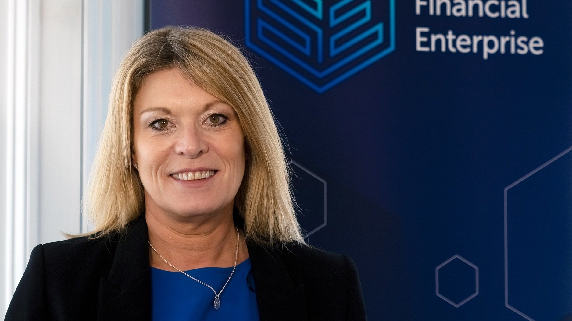
Fortnightly financial five minutes #18 Jayne Currie
Nigel Yeates, Communications and Stakeholder Business Partner, speaks to Jayne Currie, Director of Membership Services at Scottish Financial Enterprise, about Scotland’s financial services industry and driving financial awareness.
Please can you tell our readers more about Scottish Financial Enterprise (SFE), who you represent, and your role there?
We are the representative body for Scotland's financial services industry. In 2021 we launched Scotland’s Financial Services strategy (pdf 4.6MB) that was created in collaboration with our members. We are clear on the areas we want to drive forward as a membership and everything we do is linked to this.
We have grown steadily over the last year, going from 86 member firms this time last year to over 110 today. Our representation across sectors is reflective of the growing industry we represent:
- Banking
- Asset Management
- Wealth Management
- Life and Pensions
- Law
- Accounting
- Credit Unions
- Data
- Recruitment
- Fintech
My role as Director of Membership Services is to ensure I deliver events and activities that are important to our members and helps progress our strategy. I regularly ask members for feedback to inform our events strategy and work to connect members together when I see opportunities for our members to collaborate and innovate together for the greater good of the industry, the customers we serve or communities we operate in.
You also have a Young Professionals network, please tell us more about the importance of this group.
Our young professional network is a real asset to SFE and our industry. We have over 1200 active members, with their own committee and workstreams linked to the strategic pillars we are collectively driving forward as an industry:
- Economic Growth
- Journey to Net Zero
- Skills and Inclusion
- Customer
The network has its own events programme with a focus on leadership development, expanding industry knowledge, latest innovations, and networking with peers. Most of the young professional events qualify for continuing professional development hours (CPD) and our members are provided with a personal record of events attended across the year to support performance conversations.
What is SFE doing, and what more can be done to drive financial awareness and education amongst consumers?
Across our membership a huge amount is going on – both directly to customers (for example, workplace education to pension customers) and also working with the third sector and in schools and communities. To give a few examples, many of our investment member firms are collaborating on Kickstart Money and with MyBnk to deliver financial education in primary schools; NatWest has its Money Sense programme and its Rooster Money app, Barclays delivers its Life Skills programme. Many of our members also have partnerships that use third sector expertise such as Citizens Advice, StepChange and Turn2Us to specifically work with those who are facing financial difficulties.
Our role at SFE is focused on how we enable firms to share best practice, and also how we represent the sector and work with regulators and government to develop and share insight in to ‘what works’ and makes the biggest difference to people’s financial capability, based on evidence. We’re also one of the founding members of ‘Financial Inclusion for Scotland’, a cross-sector initiative looking at a range of areas to improve financial inclusion from access to affordable advice, to the use of financial technology and innovation.
How do SFE and your members view the value of FSCS to the financial services sector?
We’re hugely fortunate in the UK to have a robust and highly regarded regulatory and financial system. We know that Scotland benefits as a financial centre from the international reputation of its regulatory regime. Part of that environment is safeguards like FSCS.
It’s also important for customers to know and have clarity around what happens in the rare event that things do go wrong, and firms fail – it provides an underpin that sustains confidence in the system, as well as providing a safety net for customers impacted by failures, which is crucial for directly limiting the damage and adverse impact to their financial wellbeing.
Now, on a more personal note, if £10,000 landed in your lap tomorrow, what would you do with it?
It’s obviously tempting to just blow it on an extravagant holiday from my wish list but I’m at the stage in life where I’m trying to get the mortgage paid off so anything I can do to reduce the years left to pay has to be the priority. It is also going to be much cheaper to travel to my exotic destinations when I don’t need to pay for the teenagers too!
Thanks very much Jayne for those thoughts and we look forward to working further with Scottish Financial Enterprise.
For more information on what FSCS protects, see our What we cover page.
The content of any discussions shouldn't be taken as an indication of future FSCS policy positions. The views expressed by guests are their own and don't reflect the views of FSCS.
We would also love everyone to dedicate a regular extra five minutes to check their financial products and services are FSCS protected.